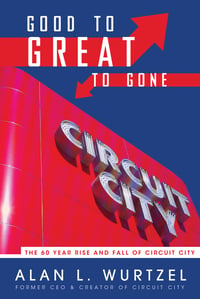 What’s made your business successful?
What’s made your business successful?
In Understand Success – Your Flywheel Architecture & Extensions we shared how Circuit City built an extraordinary business, created a flywheel extension in CarMax, while falling into the doom loop and eventually extinguishing itself.
In Amazon Flywheel transformed its business - Bezonomics we shared how when Jeff Bezos faced uncertain times in 2001 he brought in Jim Collins to help his leadership discover their flywheel, which Bezos calls Amazon’s secret sauce, the key driver to Amazon's success.
That blog started with Collins’ quote from his Stanford Graduate School professor which inspired his journey to write his books:
"The greatest danger in business and life lies not in outright failure but in achieving success without understanding why you were successful in the first place."
~ Robert Burgelman, Stanford Graduate School of Business Strategy Professor
In Good to Great to Gone: The 60 Year Rise and Fall of Circuit City, Alan Wurtzel illustrates the principles from Good to Great. Wurtzel shares 12 Habits of Mind he considers essential to organizational success. .jpg?width=300&name=12%20Habits%20of%20Mind%20(Good%20to%20Great%20to%20Gone).jpg) At the end of each chapter he provides perspective on key moments in the company’s history and the lessons learned from the results of the strategic decisions made through these 12 habits. A brief version can be seen in the picture here. For definitions of each habit, download the full 12 Habits here.
At the end of each chapter he provides perspective on key moments in the company’s history and the lessons learned from the results of the strategic decisions made through these 12 habits. A brief version can be seen in the picture here. For definitions of each habit, download the full 12 Habits here.
Success
What does success look like in your business? Does success look different today then it did just a few months ago before COVID19 started?
Perhaps it wasn’t as important to understand why you were successful before, as it is now.
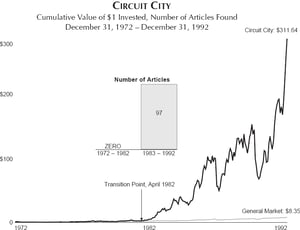 Hindsight is 20-20. Looking in the rearview mirror provides a perspective that is nearly flawless. Wurtzel’s Good to Great to Gone offers this viewpoint.
Hindsight is 20-20. Looking in the rearview mirror provides a perspective that is nearly flawless. Wurtzel’s Good to Great to Gone offers this viewpoint.
Circuit City failed for a variety of reasons. Leadership was a primary reason. 1999-2001 was the last year the company created and approved a three-year plan. That plan was flawed. The plan identified the issues Circuit City faced, proposed aspirational goals, yet it failed to set clear strategies to accomplish them or the metrics to show if they were achieved.
Execution, as we define it in Scaling Up, is divided into three disciplines (routines) fundamental to execution:
- Priorities: Less is more in driving focus and alignment.
- Data: Qualitative and quantitative feedback provides clarity and foresight.
- Meeting Rhythm: Give yourself the time to make better/faster decisions.
Circuit City failed to set priorities and execute against those objectives.
It should be noted Alan Wurtzel left the Circuit City board and sold his stock in 2001.
Why Circuit City Failed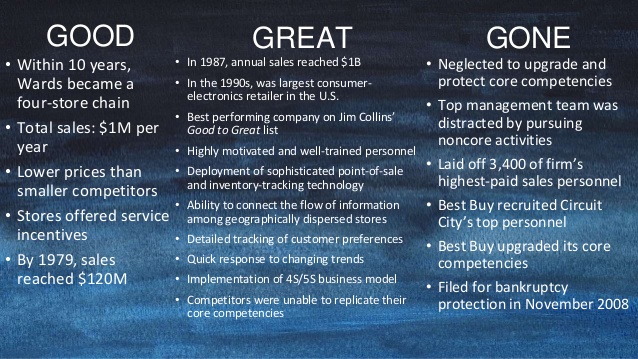
Wurtzel offers this verdict of Circuit City in his Epilogue:
In the end success business – and this includes the business of not-for-profit organizations comes down to two things: strategy and execution.
Strategy is the art and science of harmonizing organizational goals, resources, and talent with the relevant external environment. This requires the hard work of developing realistic organizational goals as well as objectively assessing organizational capacities, and the equally difficult task of understanding the environment and sorting out what aspects of that environment are relevant to your success. Strategic planning is analytical process that takes both time and mental effort. The task is too important for the CEO to delegate and too burdensome to be done annually.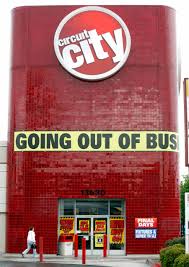
Execution is about management, and management is about achieve results through the efforts of other people. This requires being a leader, motivating others, setting standards, and demanding accountability. Being a good leader has more to do with values, feelings, empathy, and a host of other “soft” skills for which analytical thinking is a lot less relevant, and may on occasion, be counterproductive.
Flywheel
Sam and Alan Wurtzel followed Jim Collins and Morten T. Hansen, Great by Choice: Uncertainty, Chaos, and Luck — Why Some Thrive Despite Them All, quote, “Greatness is not a function of circumstance. Greatness, it turns out, is largely a matter of conscious choice, and discipline” to achieve greatness.
 When Alan Wurtzel stepped down in 1986 as CEO, Richard Sharp took over. Circuit City realized in the mid 80’s within 5-10 years they would run out of attractive markets to build or add stores. CarMax became Circuit City’s big opportunity when it opened in 1993. It followed Circuit City’s original flywheel rocketing to success. It was so successful Wayne Huizenga attempted to buy it, eventually building AutoNation into a bigger but copycat business.
When Alan Wurtzel stepped down in 1986 as CEO, Richard Sharp took over. Circuit City realized in the mid 80’s within 5-10 years they would run out of attractive markets to build or add stores. CarMax became Circuit City’s big opportunity when it opened in 1993. It followed Circuit City’s original flywheel rocketing to success. It was so successful Wayne Huizenga attempted to buy it, eventually building AutoNation into a bigger but copycat business.
CarMax is Circuit City’s most enduring tangible legacy. Had the leadership successors understood their success, perhaps Circuit City would still be around.
Is it time your business identified why you are successful? Is it not only time to discover your Flywheel, but build an extension of it? To discover your Flywheel Architecture, contact us today to schedule an exploratory meeting.
Growth demands Strategic Discipline.
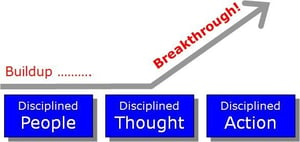 To build an enduring great organization, requires disciplined people, disciplined thought, disciplined action, to produce superior results, and make a distinctive impact in the world.
To build an enduring great organization, requires disciplined people, disciplined thought, disciplined action, to produce superior results, and make a distinctive impact in the world.
Discipline sustains momentum, over a long period of time, laying the foundations for lasting endurance.
-2.jpg?width=300&name=3%20Disciplines%20of%20Execution%20(Strategic%20Discipline)-2.jpg) A winning habit starts with 3 Strategic Disciplines: Priority, Metrics and Meeting Rhythms. Forecasting, accountability, individual, and team performance improve dramatically.
A winning habit starts with 3 Strategic Disciplines: Priority, Metrics and Meeting Rhythms. Forecasting, accountability, individual, and team performance improve dramatically.
Meeting Rhythms achieve a disciplined focus on performance metrics to drive growth.
Let Positioning Systems help your business achieve these outcomes on the Four most Important Decisions your business faces:
|
DECISION |
RESULT/OUTCOME |
|
PEOPLE |
|
|
STRATEGY |
|
|
EXECUTION |
|
|
CASH |
|
Positioning Systems helps mid-sized ($5M - $250M) business Scale-UP. We align your business to focus on Your One Thing! Contact dwick@positioningsystems.com to Scale Up your business! Take our Four Decisions Needs Assessment to discover how your business measures against other Scaled Up companies. We’ll contact you.
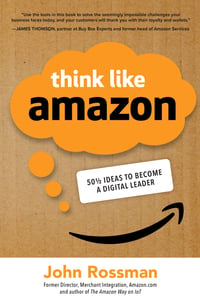 NEXT BLOG – Think Like Amazon - Deliver Results
NEXT BLOG – Think Like Amazon - Deliver Results
Amazon is incredibly successful. One of the reasons is leadership owns their dependencies. I’ll share three easy steps from Think Like Amazon: 50 1/2 Ideas to Become a Digital Leader, Jeff Bezos uses to manage dependencies to deliver outstanding results. That's next blog.






.jpeg?width=150&height=135&name=Hand%20with%20marker%20writing%20the%20question%20Whats%20Next_%20(1).jpeg)

